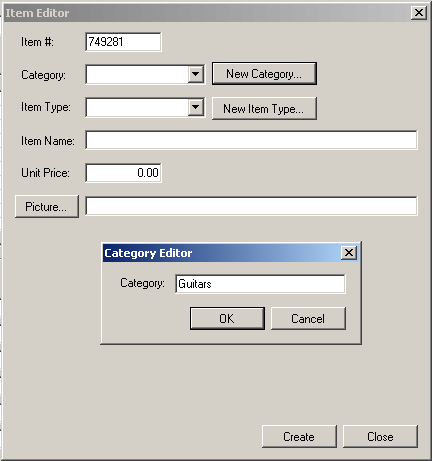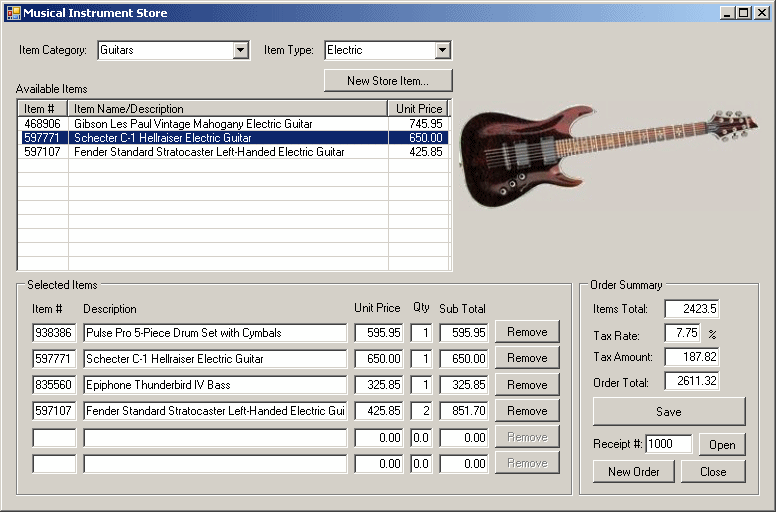|
Enumerating the Collection for each Item
|
|
One of the most valuables features of the C# is the ability
to use the for each loop to enumerate the members of a collection. To make
this possible, you must implement the IEnumerator interface in your
collection class. Following the rules of interface implementation, you must
override the members of IEnumerator.
|
Checking the Existence of an Item
|
|
One of the routine operations you can perform on a list is
to find out whether it contains a certain value. To assist you with this
operation, the System::Collections::IList interface is equipped with a method named Contains. Its syntax is:
bool Contains(object value);
This method takes as argument the value to look for. If the
value is found in the list, the method returns true. If no value is found in the
collection, this method returns false.
Here is an example of implementing this method:
Header File: BookList.h
#pragma once
using namespace System;
using namespace System::Collections;
public ref class CBookList : public IList
{
private:
int counter;
array<Object ^> ^ objects;
public:
. . . No Change
virtual bool Contains(Object ^ value);
};
Source File: BookList.cpp
#include "BookList.h"
. . . No Change
bool CBookList::Contains(Object ^ value)
{
for (int i = 0; i < Count; i++)
if (objects[i] == value)
return true;
return false;
}
This method calls the Equals() method of the objects
that make up the list to
find out whether the value argument exists in the collection. If this
method produces a wrong result, especially if you are using your own class to
represent the item, you may have to override your own Equals()
method.
|
Getting the Index of an Item
|
|
The System::Collections::IList::Contains() method is used to check whether a particular
value (already)
exists in the collection. If you know that a certain item exists in the
collection but you don't know its index inside the list, the IList interface can
assist you through a method named IndexOf. Its syntax is:
int IndexOf(Object^ value);
This method takes as argument the value to look for in the list. If the
value is found in the collection, the method returns its index. If there is no
value defined like that, the method returns -1. Here is an example of implementing
this method:
Header File: BookList.h
#pragma once
using namespace System;
using namespace System::Collections;
public ref class CBookList : public IList
{
private:
int counter;
array<Object ^> ^ objects;
public:
. . . No Change
virtual bool Contains(Object ^ value);
virtual int IndexOf(Object ^ value);
};
Source File: BookList.cpp
#include "BookList.h"
. . . No Change
int CBookList::IndexOf(Object ^ value)
{
for (int i = 0; i < Count; i++)
if (objects[i] == value)
return i;
return -1;
}
This method calls the Equals() method of the objects that make up the
collection to find out whether
the value argument exists in the list. If this method produces a
wrong result, especially if you are using your own class to represent the value,
you may have to override your own Equals() method.
|
Deleting Values in the List
|
|
|
Deleting a Value by its Index
|
|
If a value is not necessary in your list, you can delete it.
Probably the simplest way to delete a value is to specify its position in the
list. To support this operation, both the System::Collections::IList and
the System::Collections::Generic::IList interfaces are equipped with a
method named RemoveAt. The syntax of the RemoveAt() method is is
the same for both interfaces and it is:
void RemoveAt(int index);
This method takes as argument the index of the value to be
removed. Here is an example:
Header File: BookList.h
#pragma once
using namespace System;
using namespace System::Collections;
public ref class CBookList : public IList
{
private:
int counter;
array<Object ^> ^ objects;
public:
. . . No Change
virtual bool Contains(Object ^ value);
virtual int IndexOf(Object ^ value);
virtual void RemoveAt(int index);
};
Source File: BookList.cpp
#include "BookList.h"
. . . No Change
void CBookList::RemoveAt(int index)
{
if ((index >= 0) && (index < Count))
{
for (int i = index; i < Count - 1; i++)
objects[i] = objects[i + 1];
counter--;
}
}
|
Deleting an Item by its Value
|
|
The problem with deleting a value based on its index is
that, if you are not sure, you could delete the wrong value. An alternative is to
first precisely define the value you want to get rid of, and then hand the value
itself to the compiler that would remove it. To support this approach, the System::Collections::IList
interface is equipped with a method named Remove() and whose syntax is:
void Remove(Object^ value);
This method takes as argument the value to be deleted. This
means that the compiler will first look for the value in the list. If it finds
that value, it removes it. If there is no value like that, nothing happens
(the compiler doesn't throw an exception. Here is an example of implementing
this method:
Header File: BookList.h
#pragma once
using namespace System;
using namespace System::Collections;
public ref class CBookList : public IList
{
private:
int counter;
array<Object ^> ^ objects;
public:
. . . No Change
virtual bool Contains(Object ^ value);
virtual int IndexOf(Object ^ value);
virtual void RemoveAt(int index);
virtual void Remove(Object ^ value);
};
Source File: BookList.cpp
#include "BookList.h"
. . . No Change
void CBookList::Remove(Object ^ value)
{
RemoveAt(IndexOf(value));
}
To remove all value from a list at once, you can implement Clear()
method of the System::Collections::IList interface. Its syntax is:
void Clear();
Here is an example of implementing it:
Header File: BookList.h
#pragma once
using namespace System;
using namespace System::Collections;
public ref class CBookList : public IList
{
private:
int counter;
array<Object ^> ^ objects;
public:
CBookList(void);
virtual property int Count
{
int get() { return counter; }
}
virtual property bool IsSynchronized
{
bool get() { return false; }
}
virtual property Object ^ SyncRoot
{
Object ^ get() { return this; }
}
virtual void CopyTo(Array ^ ary, int index);
virtual IEnumerator ^ GetEnumerator();
virtual property bool IsFixedSize
{
bool get() { return false; }
}
virtual property bool IsReadOnly
{
bool get() { return false; }
}
virtual int Add(Object ^ value);
virtual void Insert(int index, Object ^ value);
virtual property Object ^ default[int]
{
Object ^ get(int index) { return objects[index]; }
void set(int index, Object ^ value)
{
objects[index] = value;
}
}
virtual bool Contains(Object ^ value);
virtual int IndexOf(Object ^ value);
virtual void RemoveAt(int index);
virtual void Remove(Object ^ value);
virtual void Clear();
};
Source File: BookList.cpp
#include "BookList.h"
CBookList::CBookList(void)
: counter(0),
objects(gcnew array<Object ^>(5))
{
}
void CBookList::CopyTo(Array ^ ary, int index)
{
}
IEnumerator ^ CBookList::GetEnumerator()
{
return nullptr;
}
int CBookList::Add(Object ^ value)
{
// Check whether there is still room in
// the array to add a new item
if (counter < objects->Length)
{
// Since there is room, put the new item to the end
objects[counter] = value;
// increase the number of items
counter++;
// Return the index of the item that was added
return counter - 1;
} // Since the item could not be added, return a negative index
else
return -1;
}
void CBookList::Insert(int index, Object ^ value)
{
}
bool CBookList::Contains(Object ^ value)
{
for (int i = 0; i < Count; i++)
if (objects[i] == value)
return true;
return false;
}
int CBookList::IndexOf(Object ^ value)
{
for (int i = 0; i < Count; i++)
if (objects[i] == value)
return i;
return -1;
}
void CBookList::RemoveAt(int index)
{
if ((index >= 0) && (index < Count))
{
for (int i = index; i < Count - 1; i++)
objects[i] = objects[i + 1];
counter--;
}
}
void CBookList::Remove(Object ^ value)
{
RemoveAt(IndexOf(value));
}
void CBookList::Clear()
{
counter = 0;
}
Download:
Musical Instrument Store2
|





